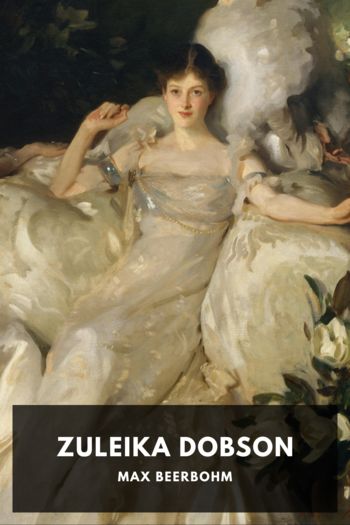Zuleika Dobson - Max Beerbohm (good e books to read txt) 📗

- Author: Max Beerbohm
Book online «Zuleika Dobson - Max Beerbohm (good e books to read txt) 📗». Author Max Beerbohm
The Christmas holidays were at hand, and before long she got an engagement. It was a great evening for her. Her repertory was, it must be confessed, old and obvious; but the children, in deference to their hostess, pretended not to know how the tricks were done, and assumed their prettiest airs of wonder and delight. One of them even pretended to be frightened, and was led howling from the room. In fact, the whole thing went off splendidly. The hostess was charmed, and told Zuleika that a glass of lemonade would be served to her in the hall. Other engagements soon followed. Zuleika was very, very happy. I cannot claim for her that she had a genuine passion for her art. The true conjurer finds his guerdon in the consciousness of work done perfectly and for its own sake. Lucre and applause are not necessary to him. If he were set down, with the materials of his art, on a desert island, he would yet be quite happy. He would not cease to produce the barber’s-pole from his mouth. To the indifferent winds he would still speak his patter, and even in the last throes of starvation would not eat his live rabbit or his goldfish. Zuleika, on a desert island, would have spent most of her time in looking for a man’s footprint. She was, indeed, far too human a creature to care much for art. I do not say that she took her work lightly. She thought she had genius, and she liked to be told that this was so. But mainly she loved her work as a means of mere self-display. The frank admiration which, into whatsoever house she entered, the grown-up sons flashed on her; their eagerness to see her to the door; their impressive way of putting her into her omnibus—these were the things she revelled in. She was a nymph to whom men’s admiration was the greater part of life. By day, whenever she went into the streets, she was conscious that no man passed her without a stare; and this consciousness gave a sharp zest to her outings. Sometimes she was followed to her door—crude flattery which she was too innocent to fear. Even when she went into the haberdasher’s to make some little purchase of tape or riband, or into the grocer’s—for she was an epicure in her humble way—to buy a tin of potted meat for her supper, the homage of the young men behind the counter did flatter and exhilarate her. As the homage of men became for her, more and more, a matter of course, the more subtly necessary was it to her happiness. The more she won of it, the more she treasured it. She was alone in the world, and it saved her from any moment of regret that she had neither home nor friends. For her the streets that lay around her had no squalor, since she paced them always in the gold nimbus of her fascinations. Her bedroom seemed not mean nor lonely to her, since the little square of glass, nailed above the washstand, was ever there to reflect her face. Thereinto, indeed, she was ever peering. She would droop her head from side to side, she would bend it forward and see herself from beneath her eyelashes, then tilt it back and watch herself over her supercilious chin. And she would smile, frown, pout, languish—let all the emotions hover upon her face; and always she seemed to herself lovelier than she had ever been.
Yet was there nothing Narcissine in her spirit. Her love for her own image was not cold aestheticism. She valued that image not for its own sake, but for sake of the glory it always won for her. In the little remote music-hall, where she was soon appearing nightly as an “early turn,” she reaped glory in a nightly harvest. She could feel that all the gallery-boys, because of her, were scornful of the sweethearts wedged between them, and she knew that she had but to say “Will any gentleman in the audience be so good as to lend me his hat?” for the stalls to rise as one man and rush towards the platform. But greater things were in store for her. She was engaged at two halls in the West End. Her horizon was fast receding and expanding. Homage became nightly tangible in bouquets, rings, brooches—things acceptable and (luckier than their donors) accepted. Even Sunday was not barren for Zuleika: modish hostesses gave her postprandially to their guests. Came that Sunday night, notanda candidissimo calculo! when she received certain guttural compliments which made absolute her vogue and enabled her to command, thenceforth, whatever terms she asked for.
Already, indeed, she was rich. She was living at the most exorbitant hotel in all Mayfair. She had innumerable gowns and no necessity to buy jewels; and she also had, which pleased her most, the fine cheval-glass I have described. At the close of the Season, Paris claimed her for a month’s engagement. Paris saw her and was prostrate. Boldini did a portrait of her. Jules Bloch wrote a song about her; and this, for a whole month, was howled up and down the cobbled alleys of Montmartre. And all the little dandies were mad for “la Zuleika.” The jewellers of the Rue de la Paix soon had nothing left to put in their windows—everything had been bought for “la Zuleika.” For a whole month, baccarat was not played at the Jockey Club—every member had succumbed to a nobler passion. For a whole month, the whole demimonde was forgotten for one English virgin. Never, even in Paris, had a woman triumphed so. When the day came for her departure, the city





Comments (0)